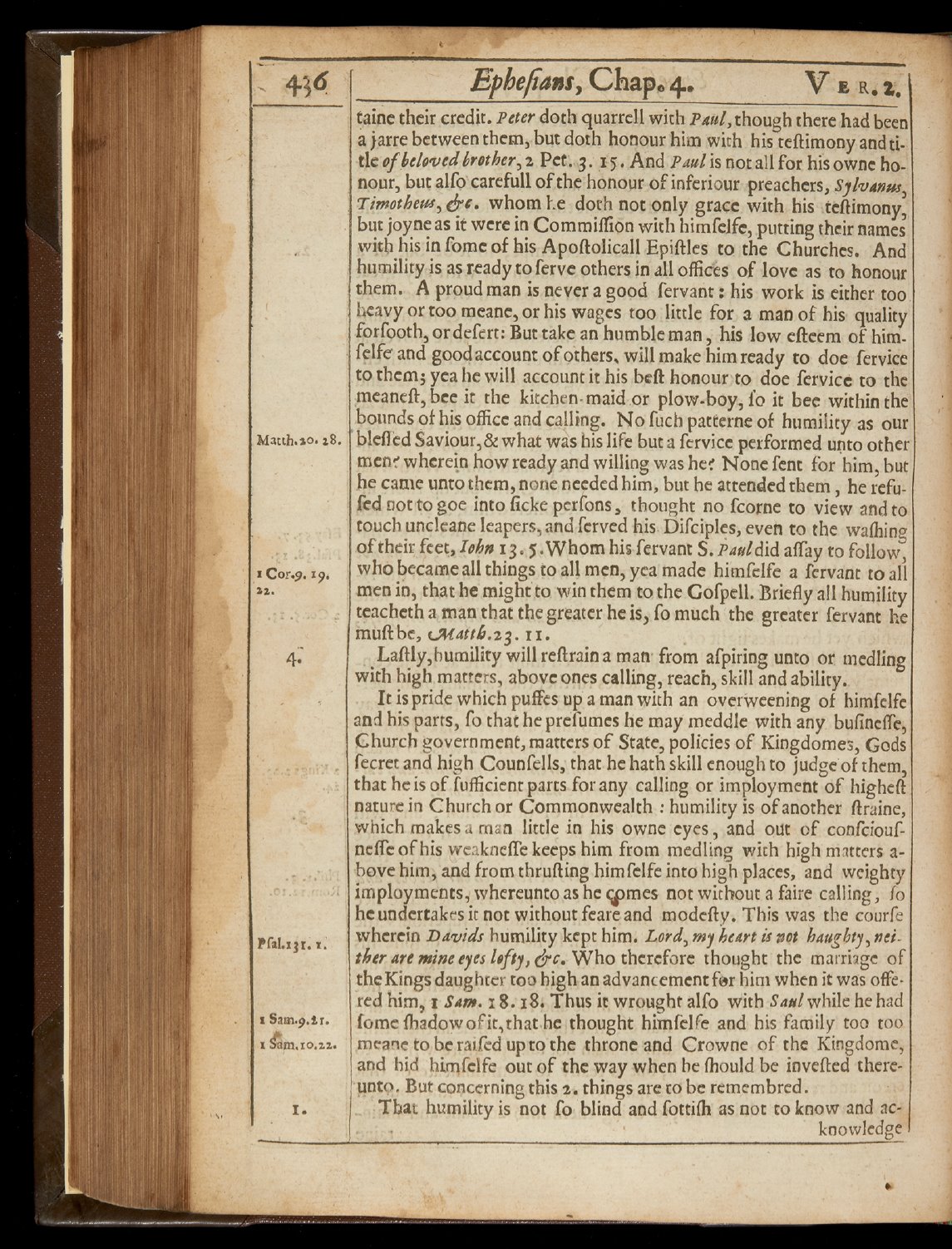

436
(
E'phe¡iant,
Chape
4.
V
E
R.Z.
tarn
their credit.
Peter
cloth
quarrell with Paul, though there had
been
a
jarre between them, but
doch
honour
him with
his
reflimony
and
ti-
tle
of
beloved brother,
z
Pct.
3.
15.
And Paul
is
not
all
for
his
owne
ho-
nour, but
alto
carefull
of
the honour
of
inferiour preachers,
Sylvanus,
Timotheut, &C.
whom
Le
doch
not only grace with
his
teftimony,
but joyne
as
it were
in
Commiflion with
himfelfe, putting
their names
with his in
fome
of
his
Apoftolicall Epiftles to the Churches.
And
humility
is as
ready to
ferve
others
in
all
offices
of
love
as
to honour
them.
A
proud man
is
never
a
good
fervant
:
his
work
is
either too
heavy
or
too
meane,
or
his
wages
too
little for
a
man
of
his quality
forfooth, ordefert:
But take an
humble
man,
his
low
efteem
of
him
-
felfe and good account
of
others, will
make
him ready
to
doe
fervice
to them;
yea he will account it his
belt honour to doe
fervice
to
the
meanefl,
bee it
the
kitchen -maid
or
plow.boy,
fo it
bee within
the
bounds of
his office and
calling.
No
fuch
pattern
of
humility
as
our
Matth.ao.
:s. blefled Saviour,& what was
his
life
but
a
fervice
performed unto
other
mene wherein
how ready
and willing was he
None
fent
for him,
but
he
came unto them, none needed him, but
he
attended them
,
he
refu-
fed
not to goe into
ficke
perfons, thought no
fcorne to view
and to
touch uncleane leapers, and ferved
his
Difciples, even
to
the
waffling
of
their feet,
Iohn 13. g.
Whom
his
fervant
S.
Paul
did affay
to follow,
,cony,
:y.
who
became
all
things to
all
men,
yea made himfelfe
a
fervant
to
all
_
:.
men in,
that
he
might
to
win
them to the Gofpell.
Briefly
all humility
teacheth
a
man
that
the greater
he is,
fo
much the greater
fervant he
muff
be,
cmattb.z3.
I.
4,
Laftly,humility will reflrain
a
man
from afpiring unto or medling
with high matters, above
ones
calling, reach,
skill and
ability.
It
is
pride
which
puffes up
a
man
with
an
overweening of
himfelfe
and his
parts,
fo
that
he prefumes he may meddle with any bufneffe,
Church government,matters
of
State,
policies
of
Kingdomes,
Gods
fecret and
high Counfells, that
he
hath
skill
enough to
judgeof
them,
that
he
is
of
fufficient
parts for any calling
or imployment
of
higheft
nature
in
Church
or
Commonwealth
:
humility
is
of
another
ftraine,
which
makes
roan
little
in his
owne
eyes,
and
out
of
confciouf-
neffe
of
his
weaknef'e
keeps
him from medling with
high matters
s-
hove him, and from thrufting himfelfe into high
places, and weighty
imployments,
whereunto
as
he
c,
mes
not
without
a
faire
calling,
fo
he undertakes
it
not without
feare and
modefly. This
was the courfe
wherein Davids humility kept him. Lord,
my
heart
is
not
haughty,
nei-
ther
are
mine
eyes
lefty,
&c.
Who
therefore thought the
marriage
of
the
Kings
daughter too high
an
advancement
for him when
it
was
offe-
red
him,
I
Sane.
18.18.
Thus
it
wrought alto with
Saul while
he had
fome fhadow
ofit,
that
he
thought
himfelfe and
his
family too too
meane to
be
railed
up
to the throne
and
Crowne
of
the
Kingdome,
and
bid himfelfe
out
of
the
way when
he fhould
be inverted
there-
unto.
But concerning
this
a.
things
are ro be
remembred.
r.
That
humility
is
not fo
blind and fottirh
as
not
to know
and
ac-
knowledge
Pral.:ar::.
i
Sam.y.tr.
Sám.:o.zz.

















